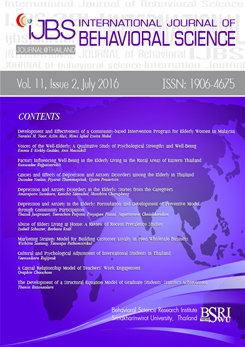Factors Influencing Well-Being in the Elderly Living in the Rural Areas of Eastern Thailand
Main Article Content
Abstract
This cross-sectional survey research was aimed at exploring the factors influencing the well-being of elderly people in rural areas of Eastern Thailand. The conceptual framework for the study was based on the PRECEDE model. Questionnaires were administered to 400 elderly by personal community-based interviews. According to the findings, it was found that age, occupation, social and religious activities, attitude toward life, relationship with the community, ability to perform daily activities, physical health status, and family relationships affected the well-being of the elderly at a 0.05 level of significance. On the contrary, gender, health problems, marital status, and education did not affect elderly well-being. Various factors affecting elderly well-being in Thailand’s cultural context included social and religious activities, relationship with the community and family relationships, which support the cultural contexts of living together as an extended family, living in a caring community and living in Buddhist communities. The findings of this study confirm the effectiveness of the PRECEDE model on developing the well-being of the elderly. The results of this research can be applied to manage some significant factors to improve the well-being of rural Thai elders, especially in terms of promoting healthy elderly behaviors such as physical activities, attitude toward life etc.
Keywords: PRECEDE, elderly, well-being, rural area, Thailand


